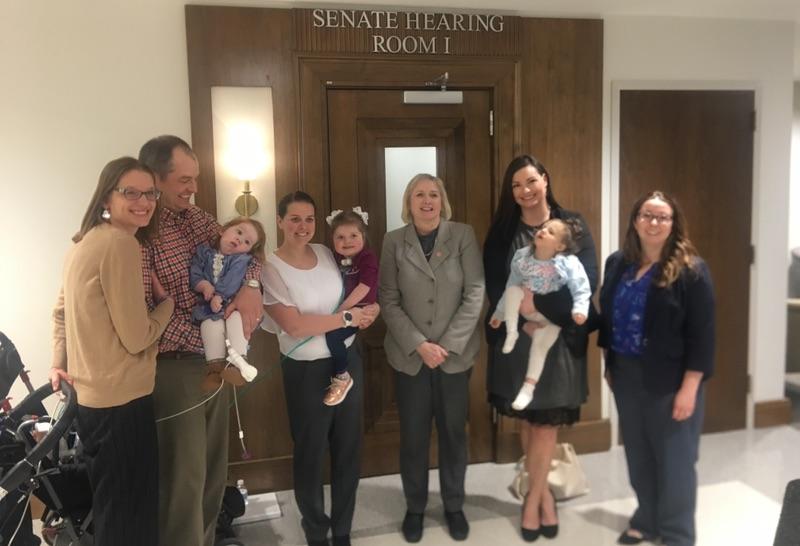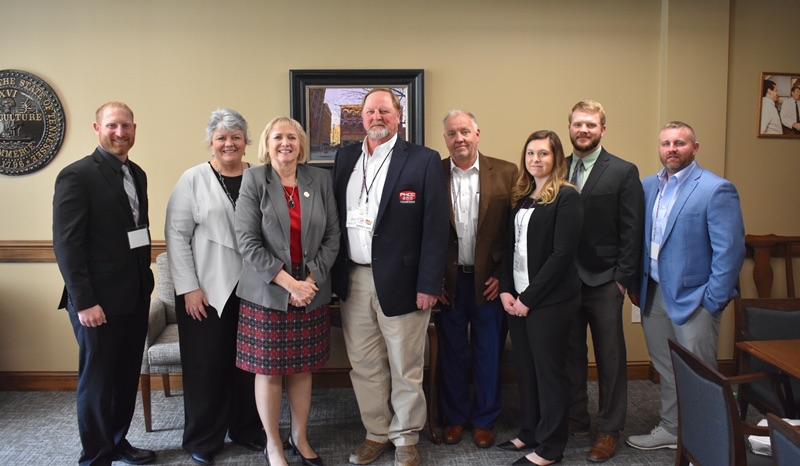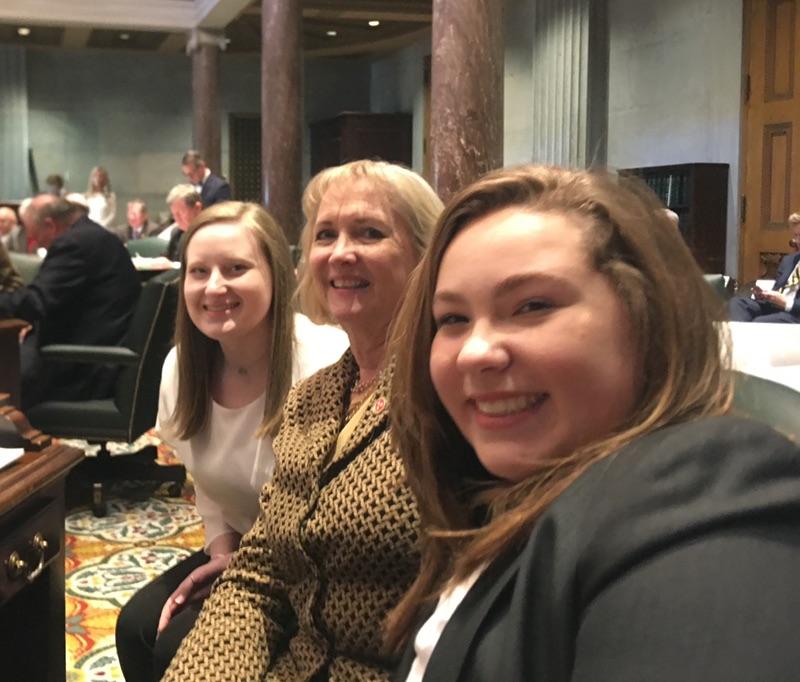
State Senators approve legislation continuing General Assembly’s ongoing efforts to combat Human Trafficking
Several bills continuing the Tennessee General Assembly’s ongoing efforts to combat human trafficking advanced last week. While the crime is largely underreported, Tennessee Bureau of Investigation (TBI) Director David Raush testified to the Senate Judiciary Committee on Tuesday that 98 cases of human trafficking were opened in the state last year, 75 of which involved minors. Experts believe, however, that as many as 94 children are trafficked in Tennessee each month.
State legislators have approved a series of bills over the past eight years addressing the problem of human trafficking after a 2011 Tennessee Bureau of Investigation (TBI) report showed 73 of the state’s 95 counties have reported the crime within their borders. These legislative efforts earned Tennessee Shared Hope International’s highest ranking for fighting human trafficking. The group’s 2018 report card scored Tennessee with a grade of 96.5, an A rating.
One bill, approved the Judiciary Committee, sets up a mechanism to provide grants to agencies specializing in comprehensive treatment and support services for victims through the Victims of Human Trafficking Fund. Senate Bill 447 gives priority to programs identified by the TBI and Department of Children’s Services which are successful in providing medical care, counseling, substance abuse services, safe housing, job training, transportation, and other basic human needs.
Another bill approved last week allows a victim of human trafficking to expunge their record of associated non-violent crimes. Under Senate Bill 577, petitioners who are able to prove they were a victim of human trafficking to the district attorney and judge, could have all violations subject to expungement cleared from their record. All sentences, including probation, must be completed before the record is cleared and expunged convictions would be reinstated if the victim commits similar crimes in the future. The legislation is pending final action in the House of Representatives before moving to the governor’s desk for his signature.
In the Senate Education Committee, members voted to require that family life curriculum in the state’s public schools include instruction on the detection, intervention, and treatment of human trafficking in which the victim is a child. Senate Bill 1195 also calls for teachers to receive a one-time in-service training on the detection, intervention, and treatment of human trafficking when the victim is a child via video or online learning. The proposal now goes to the full Senate for final consideration.
Finally, approval was given to Senate Bill 644 in the House of Representatives on Monday which ensures that undercover human trafficking operations conducted by law enforcement officials to catch offenders who promote or patronize minors are prosecutable in Tennessee courts of law. The legislation now goes to Governor Bill Lee for his signature.
Senate gives final approval to key bills in Governor Bill Lee’s legislative package
Final Senate approval was given to several key bills in Governor Bill Lee’s legislative package last week on a wide range of issues from attacking Tennessee’s deadliest illegal drug to providing students with more work-based and apprentice opportunities, giving them a jumpstart on a high-demand career. Other measures passed by the Senate include a criminal justice reform measure and bills to increase the supplement provided to police and firefighters for in-service training and to provide tax fairness to small business owners who operate a gym.
Fentanyl — The deadly synthetic opioid fentanyl is now on the front line of Tennessee’s opioid epidemic. Approximately 50 times more potent than heroin and 100 times more potent than morphine, the drug is often mixed with illegal substances like heroin and counterfeit opioids, to make a deadly mixture. It’s so potent that an amount the size of three grains of sugar is lethal to an adult. Although the drug is used by hospitals as an adjunct to anesthesia or for acute pain in advanced cancer, most fentanyl found illegally on the streets is not diverted; rather it is sourced from China and Mexico.
Currently, the threshold for a Class A felony for fentanyl in Tennessee is 2,000 grams. Senate Bill 798 strengthens penalties, making it a Class B felony to knowingly manufacture, deliver, or sell 15 grams or more of these substances, while penalties would be punishable as a Class A felony if it involves 150 grams or more.
Give Act — Another major bill approved by the Senate last week is the Governor’s Investment in Vocational Education (GIVE) Act to expand access to vocational and technical training for Tennessee students. Senate Bill 805 is a two-pronged approach that utilizes public-private partnerships to develop work-based learning and apprenticeship opportunities. GIVE also provides funding for high school juniors and seniors to utilize four, fully-funded dual enrollment credits for trade and technical programs.
This bill seeks to reach the students that may not be on a track to go to a four-year university, but can get a head start on job skills that will allow them to transition into the workforce, whether it is welding, medical transcription, or becoming an EMT. Our TCATs (Tennessee College of Applied Technology) and community colleges offer a wide variety of courses that students can take to help them get a high-skill, high-demand job.
The Tennessee Student Assistance Corporation will determine which courses will be eligible for dual enrollment under the bill. In his budget, Governor Lee proposed that $4 million be expended from the state’s Tennessee Lottery Education Fund to pay for the program.
Repeal of Gym Tax – Senate Bill 960 repealing the state’s amusement tax on gym memberships is headed to Governor Bill Lee for his signature after receiving final Senate approval on Thursday. The nearly 10 percent amusement tax is placed on memberships to gyms, fitness centers, and health clubs, disproportionately impacting small business owners.
This legislation makes it a level playing field for all fitness centers in the state, and will hopefully promote better health for Tennesseans. According to the Department of Health, Tennessee ranks 40th in the nation for physical activity and 35th for adult obesity. Recent estimates show that illnesses related to diabetes, hypertension, and cardiovascular disease costs Tennessee directly and indirectly more than $5.3 billion annually.
Increasing Police and Firefighter In-Service Pay Supplement – Legislation proposed by Governor Lee to raise the supplemental pay received by professional fire fighters and police officers for successful completion of their annual in-service training has received final Senate approval. Senate Bill 793 increases the amount from $600 to $800. There are approximately 6,848 firefighters and 14,680 law enforcement officers that are eligible for the cash salary supplement, for a total of 21,528 individuals. The proposal now awaits final consideration by the full House of Representatives.
Criminal Justice Reform / Expungement Fee — State Senators took final action on legislation to eliminate the burdensome $180 expungement fee associated with clearing records of certain criminal charges as part of Governor Bill Lee’s criminal justice reform efforts. Individuals with clear records are much more likely to secure employment and stable housing instead of re-entering prison. Senate Bill 797 applies to the fees charged by the State of Tennessee, while the $100 charged by the county would remain in place.
The legislation is pending action in the Finance, Ways, and Means Committee in the House of Representatives next.

Tennessee Engineers Day on the Hill always brings out a big turnout

It was an honor to meet with the families advocating for the “Katie Beckett Waiver” after they testified in committee
Senate Commerce Committee approves “Katie Beckett Waiver Bill” to expand TennCare coverage for in-home care to children with severe disabilities
Legislation seeking to expand TennCare coverage for in-home care for children with severe disabilities, regardless of their parents’ income, overcame its first hurdle this week with unanimous approval by the Senate Commerce and Labor Committee. Action on Senate Bill 476 followed powerful testimony from parents struggling to provide home care for severely disabled children with acute needs and whose incomes exceed current TennCare limits.
In order to implement the TennCare changes, the legislation directs the Tennessee Department of Finance and Administration to submit a waiver request to the U.S. Center for Medicare and Medicaid Services (CMS) to establish a Katie Beckett Program in Tennessee.
The program is named for a young girl who was diagnosed with a brain infection in 1978 at only five months old. Medicaid covered Katie’s hospitalization for almost three years after being diagnosed. However, once her parents and doctors decided she would receive better care at home, she was no longer eligible to receive Medicaid, although her home care cost would have been one sixth of the expenses incurred in a skilled healthcare setting. Once President Ronald Reagan heard of this situation, his administration waived the rules to let Katie and children in similar situations receive care at home, while retaining their Medicaid coverage, regardless of their parents’ income. This gave rise to the Katie Beckett Program which created the opportunity for states to apply for a waiver, allowing them to use federal and state dollars to pay for in-home care.
The testimony last week echoed similar situations by Tennessee parents struggling to meet family and financial obligations, while providing intensive around-the-clock care for children with severe disabilities.
Tennessee is the only state that does not have a Katie Beckett waiver or its equivalent. The bill now travels to the Senate Finance, Ways, and Means Committee for consideration of its financial impact.

I was pleased to visit with members the Knoxville area chiropractors
In Brief
Proton Therapy – Legislation, which I am the prime sponsor, was approved by the Senate Commerce and Labor Committee this week allowing state employees diagnosed with cancer to receive hypofractionated proton therapy if the physician and patient believe that it would be more beneficial to their treatment plan. Senate Bill 195 creates the Proton Therapy Access Act. The state insurance program would be required to cover proton therapy at the same rate that would be paid for traditional radiation therapy (IMRT), as long as certain conditions have been met. The legislation will now be heard on final consideration on the Senate floor.
Resolution seeks to address temporary incapacitation of governor – A resolution allowing voters to change the state’s constitution to address any potential incapacitation of Tennessee’s governor was approved by the Senate State and Local Government Committee. Senate Joint Resolution 154, which I’m also sponsoring, provides for any planned or unplanned absence of the governor when the powers and duties of the office cannot be performed.
When the temporarily incapacitation is planned, such as major surgery, a written declaration from the governor would be submitted that the powers and duties will be temporarily discharged by the speaker of the Senate. In Tennessee, the speaker of the Senate also acts as Lt. Governor. If the incapacitation is the result of a sudden incident where the governor is unable to submit a declaration, then the majority of five administrative commissioners of the governor’s cabinet would make a determination. The commissioners would then submit a written declaration to temporarily name the speaker of the Senate as acting governor. These duties would fall to the speaker of the House of Representatives in both cases if the Senate speaker’s office is vacant. The acting governor would continue to perform the duties of the office until the governor transmits that he or she is able to resume their responsibilities. While acting as governor, the speaker will maintain their position and salary; however, they will not preside as speaker or vote as a member while acting as governor.
Before proceeding to a vote by the people, the resolution must be approved by a simple majority of the 111th General Assembly during the 2019-2020 sessions and by a two-thirds majority of the 112th General Assembly which will convene in 2021-2022. Once on the ballot, constitutional amendments must receive a plurality of votes cast in the gubernatorial election.
Aggravated Sexual Battery / Public Records — Members of the Senate Judiciary committee approved a measure to add aggravated sexual battery to the list of what can be made public in a delinquency proceeding. Senate Bill 584 requires petitions and orders of the court in a delinquency proceeding to be opened to the public if the conduct would constitute aggravated sexual battery if committed by an adult. The juvenile would have to be 14 years of age or older at the time of the alleged act for this to apply. Under current law, delinquency proceedings open to the public include conduct such as first and second degree murder, rape, aggravated rape, rape of a child, aggravated rape of a child, aggravated robbery, kidnapping and aggravated kidnapping. The bill now moves to the Senate floor for a final vote.
Statewide Automated Victim Information and Notification Service — The Senate Judiciary Committee approved legislation on Tuesday to allow for more opportunities for the Tennessee Statewide Automated Victim Information and Notification (SAVIN) service by removing the $650,000 cap on grants per year. The SAVIN service, which is administered by the Tennessee Sheriffs Association through an annual grant from the Tennessee Department of Finance and Administration’s office of Criminal Justice Programs, was established in 2009 to increase safety of crime victims and others affected by providing access to timely information concerning the custody status of offenders in county jails. Victims and other concerned citizens can register anonymously by phone or website to be notified of an offender’s release, transfer, escape, or death.
Since its inception, the SAVIN service has registered over 785,000 citizens, including 222,000 new registrations in 2018 alone. As the service has grown, the cap removes the opportunity to enhance and expand the service through utilization of existing available revenue, as well as the potential federal grants. Senate Bill 450 removes this cap, allowing existing revenues and other available grant money to be used to maintain, promote, enhance and expand the Tennessee SAVIN service, in order to help more victims of crime across the state.
Statewide Standardization / Food and Drink Regulations – A bill was approved by State Senators continuing legislative efforts to protect Tennessee’s top status as a business-friendly state. Senate Bill 431 would prevent a patchwork of local ordinances from hundreds of jurisdictions in Tennessee governing the sale or use of such items as straws, plastic bags and the regulation of food item content, like the “big gulp” soft drink. The proposal follows movements in certain U.S. cities to restrict, ban, or tax the use or sale of certain containers, foods, and drinks beyond what is required by state regulation. It also follows efforts by some local governments to mandate menu labeling and regulate the size of food, and drinks sold to the public. This includes Tennessee, where local ordinances are already being considered in Nashville to mandate menu labeling and in Memphis to tax plastic bags.
The statewide standardization bill prohibits local governments from banning, restricting or taxing certain materials used in food retail businesses and from enacting such ordinances based on food or drink content. It specifies that such restrictions or bans must originate in the Tennessee General Assembly, a practice used by other states like Arizona, Mississippi, California, and Minnesota. The proposal is supported by a wide array of groups including the Beacon Center, Beverage Association, Nation Federation of Independent Business (NFIB), Tennessee Chamber of Commerce, Tennessee Fuel and Convenience Store Association, Tennessee Grocers and Convenience Store Association, Tennessee Hospitality and Tourism Association, and Tennessee Retail Association.
Increasing Awareness / Work Readiness Programs — Legislation increasing awareness for post-secondary and work readiness programs offered to high school students by their Local Education Agencies (LEAs) unanimously passed the full Senate floor on Monday. Offering opportunities for high school students to earn college credit or a professional certification can produce extremely valuable long-term benefits and helps the state meet its Drive to 55 goal to increase post-secondary graduation rates. Senate Bill 1398 requires notification to students and their families of all early college and career opportunities offered by the school district. Programs include work-based learning, apprenticeships, dual enrollment programs, dual credit programs, and college credit-bearing courses. The legislation also calls for listing the opportunities on the school district’s website. The bill now awaits approval from the House of Representatives.
Non-Communicative Persons / Take Me Home Bill — Legislation seeking to help non-communicative persons return home safely, rather than transporting them to jail for identification purposes, has been approved by the full Senate. Under current law, when law enforcement officers encounter persons who cannot identify themselves, they are often taken to jail so that a positive identification can be made. While this law makes sense for those who desire to hide their identity, it works a great hardship on non-communicative citizens such as those with autism, dementia, or other similar conditions.
Senate Bill 576 will help the City of Chattanooga share software which allows families to register a non-communicative person with local law enforcement agencies so police officers will have instant access to the identifying information necessary to bring them home. The bill establishes limited good-faith immunity for any defect or malfunction in a software program so Chattanooga can distribute it to other local governments in Tennessee without cost to the recipient. The proposal was brought to the legislature by the parent of a young man who is non-communicative due to autism and is modeled after similar laws in other states.
Lemonade Stand Bill — The Senate Commerce and Labor Committee approved legislation this week referred to as “The Lemonade Stand Bill”. Senate Bill 433 prohibits a local government from requiring a license, fee, or permit for a business that is operated solely by a person under 18 years of age, is located on private property with the property owner’s permission, and generates gross receipts of less than $3,000 per year. The legislation aims to help young people in Tennessee who might want to open a lemonade stand, start a lawn mowing business, or similar venture; and ensures they will be able to do so without being stifled by regulation. It seeks to encourage an entrepreneurial spirit among young people, rather than discourage it. The bill will now move to the floor for final approval by the Senate.
Extending Tax Exemption / Farmers — An exemption from sales and use tax for agricultural trailers and vehicles was approved by the Senate Finance, Ways, and Means Committee this Tuesday to help Tennessee farmers. Under current law only trailers used to transport livestock are exempt from sales and use tax. Senate Bill 713 extends the exemption to include all trailers used to transport livestock; farm products; nursery stock; or equipment, supplies, and products used in agriculture from state and local sales and use tax. The legislation will now go to the full Senate to receive final approval.
Consumers / Times Share Contracts — The full Senate approved consumer protection legislation this week to make it more convenient for a time share purchaser to cancel a contract within the allotted time period provided under Tennessee law. Currently, time share sales contracts are voidable for 10 days from the date of the signing if, prior to signing, the purchaser has made an on-site inspection of the project or property. Senate Bill 263 amends this law to specify that an on-site inspection by the purchaser of any component site of the time share project will also trigger the applicable recession period for the purchaser’s right of cancellation. This helps consumers, who must travel a long distance to trigger cancellation of the contract, by allowing them to inspect any closer component sites.
Flood Damage / Tennessee Highways — The Tennessee Department of Transportation reported that damages to the state highway network as a result of flood damage suffered last month are widespread. Damages were incurred at 232 site specific locations, requiring the department’s staff to react to an array of impacts in 72 counties. This includes 58 slides and/or rockfalls on state highways. Seventy-five locations on state highways were closed to traffic due to flooding. There were 99 other types of impacts, ranging from sinkholes to escape barges hitting bridges. The total cost of repairs is estimated at $70.8 million. Governor Bill Lee has requested major disaster relief from President Trump and the Federal Emergency Management Agency (FEMA).
Education Preparation Programs — The Tennessee Comptroller’s Office has released a new report examining Tennessee’s Educator Preparation Providers. Educator Preparation Providers (EPPs) are institutions of higher education or other organizations that recruit, train, and produce licensed teachers. The report describes the steps EPPs take to prepare new teachers, shows how Tennessee’s EPPs perform on multiple measures of effectiveness, and explains how EPP outcomes are included in the outcomes-based funding formula and Quality Assurance Funding Program for higher education institutions. The report includes three policy considerations to improve teacher preparation: (1) public EPPs should consider surveying those who completed the program to gauge improvements, (2) Tennessee’s public EPPs could calculate the cost per completion for each of the licensure pathways offered, (3) public EPPs should consider studying the feasibility of creating job-embedded programs and teacher residencies that function similarly to those operated by EROs. The full report is available on the Tennessee Comptroller’s website.
Converting Plastics to Petroleum-based Products — The Senate approved legislation this week to help incentivize the use of new, innovative technology to convert non-recycled plastics into valuable fuels, chemical feedstock, and other petroleum-based products. The bill aims to decrease the amount of plastics that goes into landfills in the state. Senate Bill 923 creates statutory certainty about how that technology can be used by adding and clarifying language regarding the process. It clarifies that post-use polymers and recoverable feedstocks, which are sorted but not currently being mechanically recycled, are not considered solid waste. Additionally, the legislation clarifies that the pyrolysis and gasification facilities that are processing these materials are not solid waste processing facilities or incinerators.
The goal is to move materials, such as non-recycled plastics, out of landfills and into valuable new products, such fuels and chemical feedstocks. The legislation will also send a message that Tennessee is open for the economic development of this technology. Converting just 25 percent of the recoverable plastics in Tennessee to plastic, chemical feedstocks, and transportation fuels could support eight advanced recycling and recovery facilities, generating $264 million in annual economic output and providing fuel for up to 219,000 Tennessee cars each year.

Members of the Knoxville Home Builders Association stopped by for a visit

I enjoyed my visit with Janet Cockrum and her associates with Safe Families For Children

The Kredich family stopped by before testifying
in committee for my bill to allow “Step Up”
students to live in campus housing

Members of the Plumbing-Heating-Cooling Contractors Association stopped by for a visit.

I enjoyed having Meredith Wormsley and Courtney Miller as my Pages for the Day
Me in office
For information on State Senators including phone numbers and email addresses, click Tennessee State Senators.
For House members, click Tennessee House Members
For all other information on the General Assembly including legislation, schedules and videos, click Tennessee General Assembly
As always thank you for continued support!
Sincerely,
Becky Massey
District 6 Senator
615-741-1648.
